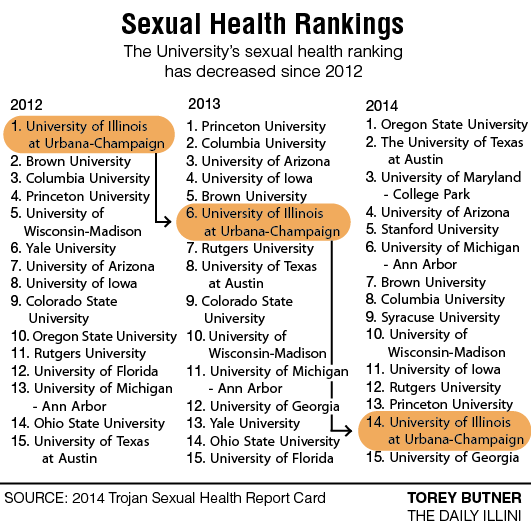University sexual report card grade lowers

October 29, 2014
In the most recent Trojan sexual health report card, the University fell from No. 1 in 2012 to No. 14 this year, although University employees say McKinley Health Center hasn’t drastically changed sexual health services offered to students.
Each year, Trojan releases the report card, which analyzes the sexual health resources and information available to students in over 140 major universities across the nation.
The research, conducted by independent research firm Sperling’s BestPlaces, measures hours of operation and accessibility of sexual health resources, such as the education program, quality of information available to students and availability of contraceptives and testing for sexually transmitted infections.
Patrick Trinley, senior in LAS and former First Year Campus Acquaintance Rape Education instructor, said the fall in the ranking is somewhat disappointing. While he believes the University provides students with some resources regarding sexual health, he said it can do more in regards to sexual education, such as offering more classes on the subject.
“There is a human sexuality class, but there’s nothing like a FYCARE program that’s given by the University for students,” Trinley said. “If we educated our students about sex in general better, I think that would be extremely helpful,” Trinley said.
Get The Daily Illini in your inbox!
However, Lena Hann, clinical instructor in the department of Kinesiology and Community Health, said she believes it is still great for the University to be in the top 15. She said only looking at the ranking decreasing from No. 1 to No. 14 is arbitrary. Since businesses are most concerned with promoting the products they sell, Hann believes there may be some limitations to how Trojan conducts its research.
“Being someone that’s in the sexual health field and being a part of the sexual health community on this campus, I think that there is always improvement that we can make, but we do have tons of resources and information available toward our students,” Hann said.
McKinley provides outreach presentations to various student organizations, as well as individual appointments to discuss sexual health, said Robert D. Palinkas, director of McKinley, in an email.
The Women’s Resources Center requires incoming students to complete the FYCARE Program, which provides students with information on how to support victims of sexual assault.
“(FYCARE) helps you as a friend or a family member to give you support,” Trinley said.
Hann said since the University has a large, diverse student population, one type of education isn’t suitable for all students. She said she also wants to help others feel like they can make educated, caring and respectful decisions. Access to condoms and testing for STIs helps do that.
Youth between the ages of 15 and 24 are estimated by the Guttmacher Institute to account for roughly half of 18.9 million new cases of STIs reported every year.
“STDs disproportionately affect young people between the ages of 15 to 25,” Palinkas said. “This is due to limited access to education and health care, multiple partners and unprotected sex.”
He added that chlamydia is a very common STD and female students who are sexually active are especially encouraged to get tested because unlike men, women usually do not have symptoms. Human Papillomavirus, HPV, is another common STD and McKinley offers the HPV vaccine to both men and women.
In order to maintain a healthier and better sexual behavior, Palinkas encouraged students to use condoms and get tested regularly. Hann added that she has learned from her classes that conversations with your partner are just as important as practicing safe sex.
“You can have condoms, but having a condom does not matter if you don’t know how to talk with your partner about why it’s important to use it,” Hann said.
She said it’s important for students, adults and parents to communicate and be honest and respectful to one another.
“I think the biggest barrier to people feeling comfortable communicating with their partners about sex is that they fear they would be judged or made fun of,” she said. “So not only how to be a good communicator, but how to be a good listener, and how two people who are very different can come together and have a mutually meaningful and respectful conversation about sex,” Hann said.
Liyuan can be reached at [email protected].






